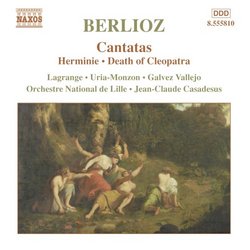| All Artists: Hector Berlioz, Jean-Claude Casadesus, Beatrice Uria-Monzon, L'Orchestre National de Lille, Michele Lagrange, Daniel Galvez-Vallejo Title: Berlioz: Cantatas Members Wishing: 0 Total Copies: 0 Label: Naxos Original Release Date: 1/1/2003 Re-Release Date: 8/19/2003 Genres: Pop, Classical Styles: Vocal Pop, Opera & Classical Vocal Number of Discs: 1 SwapaCD Credits: 1 UPC: 747313581023 |
Search - Hector Berlioz, Jean-Claude Casadesus, Beatrice Uria-Monzon :: Berlioz: Cantatas
 | Hector Berlioz, Jean-Claude Casadesus, Beatrice Uria-Monzon Berlioz: Cantatas Genres: Pop, Classical
|
Larger Image |
CD Details |
CD ReviewsMusic Well Ahead of Its Time M. C. Passarella | Lawrenceville, GA | 07/20/2005 (4 out of 5 stars) "Hector Berlioz tried four times to win the Prix de Rome, and posterity is the benefactor of his repeated failures. Nor was Berlioz at fault. Credit--or fault--instead the heads and ears of the judges who heard and couldn't make sense of Berlioz's music. Among the four works, the best known, a vehicle for operatic sopranos, is La Mort de Cleopatre. But just as interesting is La Mort D'Orfee, with its very Dionysiac final bacchanal. And for that matter, Herminie has a lovely, wistful beginning thanks to music that would later become the idee fixe of Berloz's famous Symphonie Fantastique. That alone would make it worth hearing for students of Berlioz, but it is also a work that treats its dramatic subject with sensitivity and intelligence, as is true for all these pieces. Actually, it's hard to make much of a case for La Mort de Sardanaple since what has come down to us is just a fragment of a larger work most of which is lost. However, even this music has its rewards. Berlioz uses a large battery of pretty exotic (at least for the 1820s!) percussion to capture both the barbarism and splendor of the tale of Sardanapalus. How this must have puzzled the prize committee who, once again, passed over poor old Berlioz. Besides hints of the Symphony, those familiar with Berlioz's Romeo and Juliet will hear music from that later work as well. So this music was preparation and even "recycle bin" for more famous later works, yet it is all fascinating in its own right--a tribute to Berlioz's dramatic skills and revolutionary spirit. The performances here are all good without being quite distinguished; for distinction, you need to turn, for example, to Veronique Gens (Virgin) in La Mort de Cleopatre. On the other hand, though the soloists aren 't stellar, they are certainly capable, and Casadesus gets very responsive singing from his chorus, his orchestra doing equally well by Berlioz's imaginative scoring. A nice recording, too: it places the soloists in a realistic perspective vis a vis the orchestra and captures a convincing hall sound. All in all, a fine disc for Berlioz fans and for Romantic choral music enthusiasts." Four Tragedies...All triumphs for the composer Samuel Stephens | TN, USA | 07/04/2009 (5 out of 5 stars) "We are very lucky to be living in a time where so much music is being recorded. In older times (think: EMI in the 50's), very few people would have made an effort to record this repertoire. Even more so, we can be thankful that these are wonderful versions of the music.
Actually, this CD is a reincarnation for a Harmonia Mundi France release. Many thanks to Naxos for making it generall available. Berlioz's four cantatas are more or less on the same subject: historical or mythical figure sings a final lament before he or she meets their end in a dramatic way. In these cases, the persons are Cleopatra (the famous asp to her breast), Tancredi (with his girlfriend Herminie...burning on a mound in true pagan form), Orpheus, and Assyrian king Sardanapalus. The two lyric soprano cantatas are famous enough in their own right, but the Orpheus and Sardanapalus are rare. The latter is a mere fragment of the original, apparantly burnt by the composer because he found it so banal. But that doesn't mean the piece is unworthy or unenjoyable. Every piece here shines with Berlioz' inventive musical phrasing, his prowess at vocal (and difficult) writing, and not least of all his brilliant orchestral writing. I say this a lot: "this is one of the best Berlioz CDs ever." But I have to say it again, because it's true. I won't say everyone will enjoy this CD; you'd had to have enjoyed his songs or opera bits already. Enjoy!" |

 Track Listings (4) - Disc #1
Track Listings (4) - Disc #1